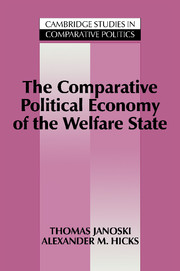Book contents
- Frontmatter
- Contents
- List of contributors
- List of tables and figures
- Preface
- 1 Methodological innovations in comparative political economy: an introduction
- PART I TIME-SERIES ANALYSIS
- 2 Introduction to time-series analysis
- 3 Direct state intervention in the labor market: the explanation of active labor market policy from 1950 to 1988 in social democratic, conservative, and liberal regimes
- 4 Quality of quantity in comparative/historical analysis: temporally changing wage labor regimes in the United States and Sweden
- 5 The politics of public and private investment in Britain
- PART II POOLED TIME-SERIES AND CROSS-SECTIONAL ANALYSIS
- PART III EVENT HISTORY ANALYSIS
- PART IV BOOLEAN ANALYSIS
- Author index
- Subject index
4 - Quality of quantity in comparative/historical analysis: temporally changing wage labor regimes in the United States and Sweden
Published online by Cambridge University Press: 05 June 2012
- Frontmatter
- Contents
- List of contributors
- List of tables and figures
- Preface
- 1 Methodological innovations in comparative political economy: an introduction
- PART I TIME-SERIES ANALYSIS
- 2 Introduction to time-series analysis
- 3 Direct state intervention in the labor market: the explanation of active labor market policy from 1950 to 1988 in social democratic, conservative, and liberal regimes
- 4 Quality of quantity in comparative/historical analysis: temporally changing wage labor regimes in the United States and Sweden
- 5 The politics of public and private investment in Britain
- PART II POOLED TIME-SERIES AND CROSS-SECTIONAL ANALYSIS
- PART III EVENT HISTORY ANALYSIS
- PART IV BOOLEAN ANALYSIS
- Author index
- Subject index
Summary
Comparative/historical social inquiry is enjoying a renaissance (Sztompka 1986; McDonald in press) signified in the reevaluation and reform of metatheoretical, strategic, and methodological practices. Although not always explicit, there is a growing awareness that comparative/ historical inquiry could be improved by creative attempts to bridge the gulf between intensive-qualitative, case-centered research and extensivequantitative, variable-based analysis. Ragin (1987), a pioneer of one particularly creative bridging strategy, has argued that “new directions in comparative research over the next several decades will involve greater attention to the gulf between intensive and extensive research and more creative effort to bridge the gulf” (Ragin 1989, p. 61). Following Ragin's forecast while recognizing limitations of his bridging strategy for the kind of research question addressed here (Griffin et al. 1991), we propose an alternative – an “intensive comparative/historical time-series” approach. We argue that this strategy (1) is capable of spanning the intensive-extensive gulf, (2) allows for changing qualitative features of quantitative relations, (3) increases the prospects for constructing historically contingent causality (Abbott 1990, 1991), and (4) can accommodate both internal and external comparison (Janoski 1991). Following brief discussion of the gulf and the foundations of our bridging strategy, we illustrate this approach in a comparative/historical analysis of U.S. and Swedish wage labor regimes.
THE GULF: INTENSIVE-QUALITATIVE VERSUS EXTENSIVE-QUANTITATIVE STRATEGIES
Comparative/historical inquiry currently follows two primary paths (cf. Rubinson 1977; Bach 1977; Treiman 1977; Burawoy 1977). More than just alternatives, these two are often characterized as alien to one another, separated by a substantial philosophical and practical gulf.
- Type
- Chapter
- Information
- The Comparative Political Economy of the Welfare State , pp. 93 - 135Publisher: Cambridge University PressPrint publication year: 1994
- 3
- Cited by



